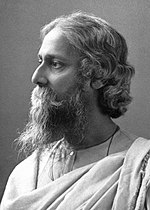Rabindranath Tagore, Date of Birth, Place of Birth, Date of Death
TweetRabindranath Tagore
Bengali poet and philosopher
 Date of Birth: 07-May-1861
Date of Birth: 07-May-1861
 Place of Birth: Kolkata, West Bengal, India
Place of Birth: Kolkata, West Bengal, India
Date of Death: 07-Aug-1941
Profession: writer, composer, poet, singer, playwright, polymath, artist, songwriter, lyricist, painter, philosopher, essayist
Zodiac Sign: Taurus 
About Rabindranath Tagore
- Rabindranath Tagore ( (listen); born Robindronath Thakur, 7 May 1861 – 7 August 1941), also known by his pen name Bhanu Singha Thakur (Bhonita), and also known by his sobriquets Gurudev, Kabiguru, and Biswakabi, was a polymath, poet, musician, and artist from the Indian subcontinent.
- He reshaped Bengali literature and music, as well as Indian art with Contextual Modernism in the late 19th and early 20th centuries.
- Author of the "profoundly sensitive, fresh and beautiful verse" of Gitanjali, he became in 1913 the first non-European to win the Nobel Prize in Literature.
- Tagore's poetic songs were viewed as spiritual and mercurial; however, his "elegant prose and magical poetry" remain largely unknown outside Bengal.
- He is sometimes referred to as "the Bard of Bengal".A Brahmo from Calcutta with ancestral gentry roots in Jessore, Tagore wrote poetry as an eight-year-old.
- At the age of sixteen, he released his first substantial poems under the pseudonym Bhanusi?ha ("Sun Lion"), which were seized upon by literary authorities as long-lost classics.
- By 1877 he graduated to his first short stories and dramas, published under his real name.
- As a humanist, universalist, internationalist, and ardent anti-nationalist, he denounced the British Raj and advocated independence from Britain.
- As an exponent of the Bengal Renaissance, he advanced a vast canon that comprised paintings, sketches and doodles, hundreds of texts, and some two thousand songs; his legacy also endures in the institution he founded, Visva-Bharati University.Tagore modernised Bengali art by spurning rigid classical forms and resisting linguistic strictures.
- His novels, stories, songs, dance-dramas, and essays spoke to topics political and personal.
- Gitanjali (Song Offerings), Gora (Fair-Faced) and Ghare-Baire (The Home and the World) are his best-known works, and his verse, short stories, and novels were acclaimed—or panned—for their lyricism, colloquialism, naturalism, and unnatural contemplation.
- His compositions were chosen by two nations as national anthems: India's Jana Gana Mana and Bangladesh's Amar Shonar Bangla.
- The Sri Lankan national anthem was inspired by his work.
Read more at Wikipedia
See Also
- Famous People's Birthdays on 07 May, India
- Famous People's Birthdays in May, India
- Famous writer's Birthdays on 07 May, India
- Famous writer's Birthdays in May, India
- Famous composer's Birthdays on 07 May, India
- Famous composer's Birthdays in May, India
- Famous poet's Birthdays on 07 May, India
- Famous poet's Birthdays in May, India
- Famous singer's Birthdays on 07 May, India
- Famous singer's Birthdays in May, India
- Famous playwright's Birthdays on 07 May, India
- Famous playwright's Birthdays in May, India
- Famous polymath's Birthdays on 07 May, India
- Famous polymath's Birthdays in May, India
- Famous artist's Birthdays on 07 May, India
- Famous artist's Birthdays in May, India
- Famous songwriter's Birthdays on 07 May, India
- Famous songwriter's Birthdays in May, India

